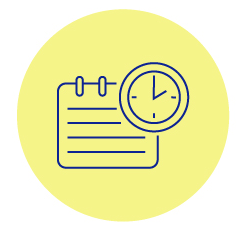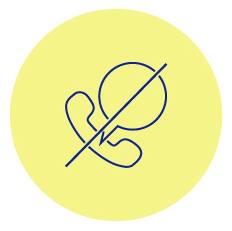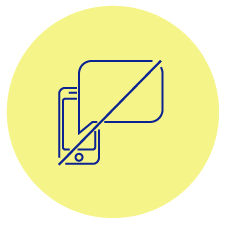Coping strategies for Adults with ADHD
You CAN become more productive, organized, and in control of your life

ADHD takes its toll on both your personal and professional life. Extreme procrastination, trouble meeting deadlines, and impulsive behaviour can leave you feeling overwhelmed and out of control. Likely adding to your frustration is the fact that your colleagues, friends, and family don’t really understand what you’re dealing with.
On the bright side, learning new skills and strategies to manage ADHD symptoms and improve your daily habits is possible—it just takes some practice and patience. In the end, they can help you work more efficiently, stay organized, and improve your sense of self-worth and foster better relationships.
ADHD at work
- Keep your workspace organized and distraction-free (store items in drawers or containers)—set aside 5-10 minutes each day to clear your desk and organize your paperwork.
- Find a quiet space (or ask for one) where you won’t be easily distracted.
- Use a day planner and to-do list, and keep it updated. Set electronic reminders on your phone or computer for meetings and due dates.
- Take notes during meetings and phone calls, then add new tasks to your to-do list straightaway.
- Set realistic goals—try to tackle only one task at a time, and use a timer to know when to move on to the next one.
- Set aside specific periods of time each day for checking and responding to messages (email and phone calls), so they don’t interrupt your other work.
- Reward yourself and take breaks when you complete something. Step away from work and move around.
- Continue taking your ADHD medication as prescribed by your doctor, even while working from home (and during your days off).


Maintaining relationships when you have ADHD
Open communication, understanding, and accountability are critical for maintaining relationships when one (or both) partners have ADHD. It is important for both partners to learn as much as they can about ADHD and its management.
One of the first steps in repairing or avoiding problems in your relationship is to put yourself in your partner’s shoes, which is especially important if only one of you has ADHD.
After truly listening to the other’s point of view (without interrupting) and making sure both of you have educated yourselves on ADHD and its symptoms, try implementing some of the following strategies.
Tips for the non-ADHD partner
- Find ways that are constructive and well received to help your partner with reminders for daily tasks, chores, appointments, etc.
- Acknowledge and encourage your partner when they make progress.
- Try to focus on intentions, rather than actions (e.g., if your partner loses concentration when listening to you, remember it doesn’t mean that they don’t care about what you have to say).
- Look for positive ways to support and motivate them as a true partner.
Tips for the partner with ADHD
- Acknowledge that your ADHD symptoms are affecting the relationship (and it’s not just your partner being unreasonable).
- Follow a treatment plan and find strategies to better manage your symptoms (and in turn become more reliable). The more this happens, the more your partner will ease off.
- When emotions are running high, take time to calm down before continuing a conversation.
- Put birthdays, anniversaries, and other important dates in your calendar so you don’t forget to acknowledge them.
- Find ways—even small ones—to show you care for your partner. It will make them feel (and act) less like your parent.
ADHD and Driving
ADHD can affect adults’ driving, as it is a complex task with constantly changing demands. Drivers with ADHD tend to be more easily distracted by objects and people in the car, and have difficulty maintaining focus during long drives. This leads to greater distraction, less monitoring of changing road and traffic conditions, and longer glances away from the road. Studies have shown that inattention is a major contributor to these issues. Therefore, drivers with ADHD have a higher risk of being involved in accidents, traffic violations, and having their license revoked. They are also more likely to be involved in serious car accidents than drivers without ADHD.
Tips to drive safely with adhd

Time your medication intake, as it
can influence your driving. Tell your
health care provider about your
driving schedule to determine the
best medication plan.

Don't drink and drive.

Avoid phone calls while driving,
as it increaes the risk of crashes
and near-crashes.

Don't text and drive. To reduce the
temptation of using your cellphone,
keep it out of sight and out of reach
or turn on Do Not Disturb Mode.
Managing ADHD at home
ADHD impacts many aspects of home life such as parenting and non-romantic relationships.
ADHD and parenting
Challenging child behaviour may result in negative parenting responses from caregivers. Positive parenting and reactions to children's difficult behaviours and emotions are critical for the development of a healthy child.
Tips for parenting with ADHD:
- Get support from your friends and family, or join support groups to connect with people who share the same struggles
- Understand how your ADHD can affect your relatives, to better address the challenges you may face
- Follow a daily routine by establishing a structure (household tasks, meal planning, playtime) and sticking to it
- Start earlier, by giving yourself more time to avoid rushing
- Take time for yourself when needed
Trouble Sleeping with ADHD?
Sleep-related problems in ADHD, such as finding it harder to fall asleep, are common. Some medicines used to treat ADHD symptoms may contribute to the issue.
Why you shouldn’t take it lying downUnderstand Your Options
When you have ADHD, learning about the different treatment options and resources available is an important step in figuring out a treatment plan that’s right for you.
Take steps to make a planNeed Help Talking to Your Doctor about ADHD?
Are you reviewing a current ADHD treatment plan, or exploring a possible ADHD diagnosis for the first time? Our Doctor Discussion Guides can help you get the conversation started.
Doctor Discussion Guides
